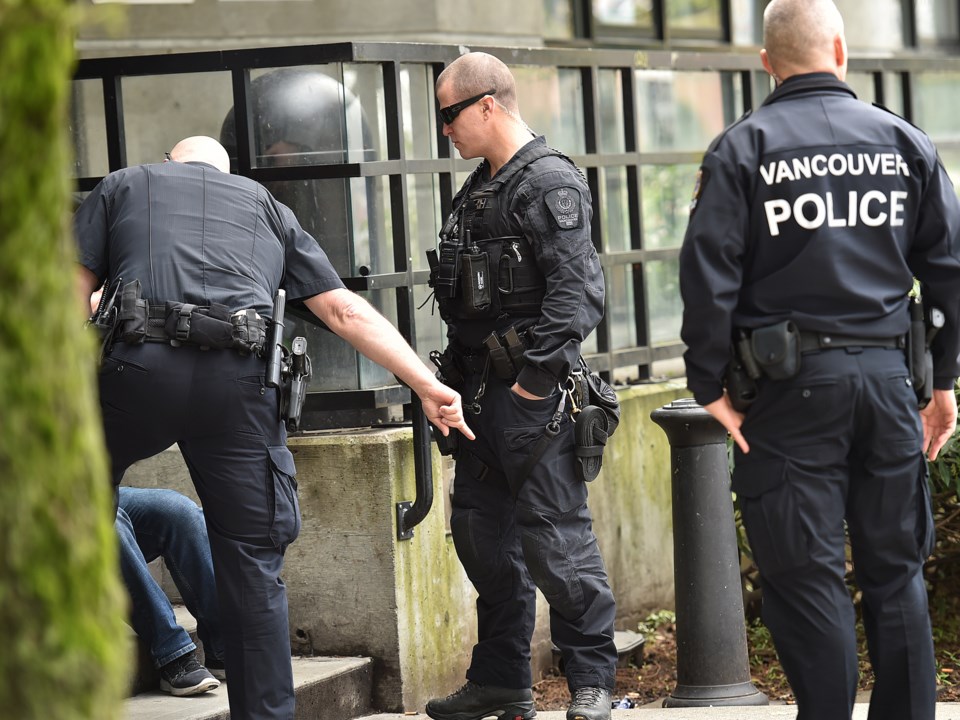The Vancouver Police Department has been conducting its own investigation into complaints from two organizations concerned about police data that shows an overrepresentation of Indigenous and black people being “street checked.”
That investigation, which was ordered by Police Chief Adam Palmer last month, will conclude with a public report and go before the Vancouver Police Board’s service and policy complaints review committee Sept. 20.
The board will then decide whether it wants a further investigation into the complaint lodged by the B.C. Civil Liberties Association and the Union of B.C. Indian Chiefs, or to dismiss the complaint with reasons.
Josh Paterson, executive director of the association, said Monday he is concerned the board will not look beyond the police department’s investigation, whatever the findings may be.
Paterson suggested an independent organization be sought to consult with Indigenous and black people most directly affected by the checks. That way, the public would have a more objective sense of what the data means.
“The board should not be making a decision on an issue as complex as this with only a VPD report to guide them as to what to do,” Paterson said. “It has the appearance of bias. With great respect to the chief, he--on day one of filing this complaint--was already out there in the media justifying their practices.”
The complaint stems from data posted in May and June on the Vancouver police’s website that was requested by a Vancouver Island blogger through a Freedom of Information request.
The data shows police conducted 97,281 street checks between 2008 and 2017.
According to the VPD’s 2017 guidelines, the definition of a street check is when an officer stops a person to conduct an interview or investigation in regards to suspicious activity or a suspected crime. The interactions take place in public, private or any place police have contact with the public.
Of the 97,281 street checks, 15 per cent (14,536) were of Indigenous people and more than four per cent (4,365) of black people. Indigenous people make up just over two per cent of the population in Vancouver, and black people less than one per cent.
“The data create a strong suggestion that street checks are being conducted in a discriminatory matter, contrary to the Canadian Charter of Rights and Freedoms and B.C.’s Human Rights Code,” said the civil liberties association and chiefs’ organization in a June 14 letter to the Office of the Police Complaint Commissioner.
Another set of data showed an overrepresentation of Indigenous women being checked. The Chiefs’ organization and civil liberties association requested the disparities in both race and gender in the number of street checks as part of the investigation.
The organizations are also concerned that some checks are not being recorded. That practice, if occurring, should also be investigated, they said, adding in a letter: “We are not concerned with informal conversations between police and the public. We are concerned with non-detention non-arrest interactions between the police and the public that are intended to elicit personal information from the subject.”
Palmer told reporters in June he welcomed the complaint and promised his department would provide more context and information on street checks.
“The fact is, it’s the actions [of the person] that drive the officers to do the checks, not somebody’s ethnicity,” the chief said. “When you look at arrest statistics, and you look at the statistics of people in our society in Vancouver that are charged with criminal offences--and those charges are approved by Crown counsel--they closely match street checks statistics. So there will be people in our society that are overrepresented, including white people, compared to their population in the city.”
Palmer said the vast majority of people arrested by police are young, white males.
“That’s who we’re checking, that’s who we’re arresting,” he said.
@Howellings



